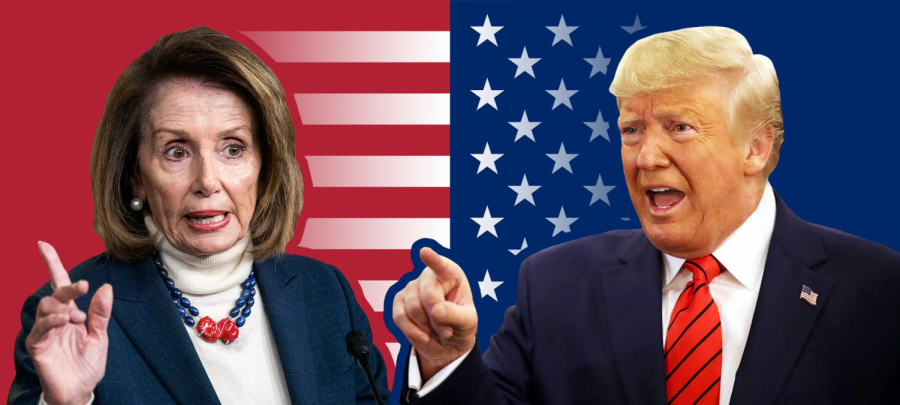People before party: on political partisanship
THE PARTY’S OVER: House Speaker Nancy Pelosi has finally announced a formal impeachment inquiry against Trump.
George Washington, the country’s first president, gave us some hard truths in his farewell address, stating, “the alternate domination of one faction over another, sharpened by the spirit of revenge, natural to party dissension, which in different ages and countries has perpetrated the most horrid enormities, is itself a frightful despotism.”
Washington’s words warned the nation of the dangers of partisanship, yet over two hundred years later, we find ourselves in a country sharply divided by it. In our polarized paradigm, people vote for a party instead of personal opinion or values, and consequently, politicians chase extreme leftist or rightist policies to gain party support, even if those policies are not entirely reasonable or moral.
Although partisanship is essential to our functioning democracy, hyperpartisanship tears the nation apart. Neither radical Democrats nor Republicans are truly American, as far-leftists may jeopardize our country’s sovereignty, while far-rightists may promote discriminatory practices; they also encourage misinformation because their biases make them ignore facts that may oppose their beliefs. Yet, as the two prominent parties in the U.S., Americans are forced to affiliate with one or the other because those who choose otherwise may not be heard, especially in this day and age.
Consequently, the public is becoming increasingly split, with members of one party often having strong prejudices against people from the opposing party. In 2016, the Pew Research Center found that 58 percent of Republicans view Democrats as “very unfavorable,” while 55 percent of Democrats view Republicans the same way, compared to 1994, when the statistic was 17 and 16 percent, respectively.
The chaos today combined with this increasing polarization creates an unstable environment—the perfect breeding ground for catastrophic events like the fall of democracy. Americans must be wary of who they choose to support and should not merely follow the leads of parties in order to live in a society that is truly based on the will of the people.
Party affiliations have had great impacts on policies, as shown by Senate Majority Leader Mitch McConnell (R-Ky.), who buried many bills, including bills mandating universal background checks for gun sales. It is safe to conclude that many politicians make decisions in the interest of their parties, rather than the public because political affiliation controls the amount of power they have in positions like the Senate.
Trump’s “Tax Cuts and Jobs Act,” which permanently lowered corporate tax rate by 14 percent among other changes, is a recent example of the extent to which politicians ignore public opinion and instead prioritize partisanship. A 2019 Gallup article reveals that the bill is extremely unpopular among Democrats, with only a 16 percent approval rating, most likely because it clearly favors Republicans, who are typically affiliated with large corporations and higher incomes. Despite this partisan divide, the law still passed managed to pass in Congress.
Furthermore, politicians have been neglecting their responsibilities of standing up for the people and what is right by passively enabling President Donald Trump to make harmful decisions for the United States.
For example, Trump nominated William Barr as Attorney General, but Barr used his position to execute extreme, conservative policies, such as making it easier to deport immigrants. His constant controversial actions lead to more radicalization and a growing distrust in the government among all Americans, particularly those who are not Republican.
Additionally, many politicians supported Trump’s nomination of Supreme Court Justice Brett Kavanaugh, despite the sexual assault allegations in the weeks before his confirmation because they wanted another conservative on the court. In this way, politicians prioritized party affiliations over morality by electing an accused rapist into one of the most prestigious positions in the nation.
In spite of all of Trump’s shortcomings, whether it be the corporate tax cuts or nominations, in the two and a half years that he has been president, there has been a considerably small number of challenges from both parties. Prior to Trump’s recent dealings with Ukraine, allegedly investigating former Vice President Joe Biden, Democrats like Nancy Pelosi had refrained from formally announcing an impeachment inquiry of Trump for nearly a year, prior to Sept. 24, in fear that it would interfere with their agendas and lose the trust of Americans.
Considering that even Democrats are garnering further scrutiny from the public for attempting to impeach Trump, it is surprising that prior Trump-supporting politicians, like former White House Communications Director Antony Scaramucci, are now choosing to criticize him; even Scaramucci, regarded by some as an “unethical opportunist,” rather than a figure with morals, is acting more reasonably than other politicians.
“I challenge my fellow Republicans to summon the nerve to speak out on record against Trump,” Scaramucci said. “Hold on to your patriotism, and help save the country from his depredations.”
However, the issue is not solely that Republicans and Democrats alike are not standing up to Trump, but that most American citizens, regardless of political affiliation, remain compliant to the pressures of polarization, and desensitized to partisan extremities that should raise concerns. Save America from the detrimental effects of extreme partisanship by staying loyal to personal beliefs, not the ones of parties.

Daniel Dai is a Northwood senior and in the Graphics position for The Howler....



![AAAAAND ANOTHER THING: [CENSORED] [REDACTED] [BABY SCREAMING] [SIRENS] [SILENCE].](https://thehowleronline.org/wp-content/uploads/2025/06/lucy-1200x800.jpg)















































